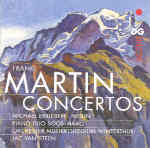Frank Martin’s Violin Concerto must be counted one of the finest 20th century works in the genre. It’s a very beautiful, lyrical work. The opening orchestral tutti alone instantly establishes an unforgettable, magical atmosphere, an amalgam of impressionism, jazz, modal harmony, and a touch of 12-tone technique. There was an old Decca recording with Wolfgang Schneiderhan (recently reissued on DG), which was quite good, but this version is in another league. Not only does Michael Erxleben essay the solo part with a wholly winning combination of shapely phrasing and rhythmic suppleness (Schneiderhan was a touch foursquare), but the Winterthur orchestra under Jac van Steen plays Martin’s austere but evocative score with real character. The balance between solo and ensemble also is perfectly judged, allowing a vivid interplay between the two and support for the soloist that, however gentle, never lacks for color and impact.
The delights continue in the composer’s jazzy Concerto for 7 Winds, Timpani, Percussion, and String Orchestra, a modern concerto grosso dating from 1949, the same period as the Violin Concerto (1950) as well as the famous Petite symphonie concertante. The outstanding performance prior to this one was Chailly’s on Decca, with the inimitable Concertgebouw winds having a picnic–but this recording is no less accomplished, and is even better recorded. The secret to a successful performance lies in the soloists’ ability to swing like jazzmen, and these players do. Danse de la peur (1936), for two pianos and small orchestra (with lots of percussion), is all that remains of a projected ballet, and it’s a moody, very evocative quarter-hour of dark, turbulent dance music. The odd scoring probably ensures that you will never hear it in concert, which makes this recording all the more valuable–a great disc of music by a wonderful composer whose comparative neglect remains a mystery.
































